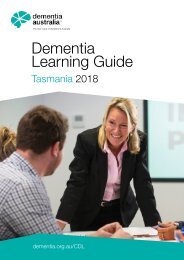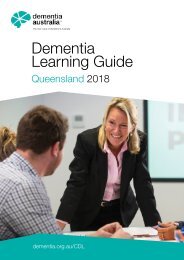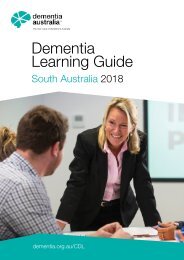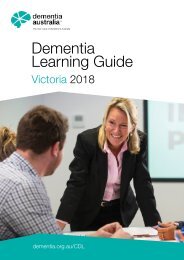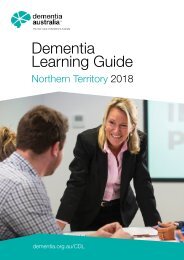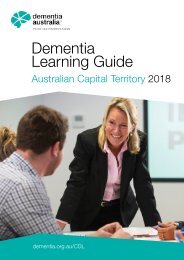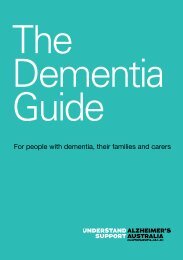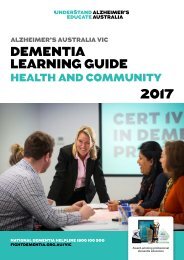Dementia Australia | The Dementia Guide
The Guide will also be used by the family and friends of someone with dementia, as it will contain information for anyone taking on a caring role. It will help people to understand more about dementia and the emotional impact of a diagnosis, the available drug treatments, and support and services that are available. It will include information about living well with dementia and about making plans for the future.
The Guide will also be used by the family and friends of someone with dementia, as it will contain information for anyone taking on a caring role. It will help people to understand more about dementia and the emotional impact of a diagnosis, the available drug treatments, and support and services that are available. It will include information about living well with dementia and about making plans for the future.
You also want an ePaper? Increase the reach of your titles
YUMPU automatically turns print PDFs into web optimized ePapers that Google loves.
Living well 4<br />
Effective communication<br />
”If I occasionally lose track of what we’re talking<br />
about, give me the time to remember, and if I can’t,<br />
don’t be nervous, impatient or arrogant. Just know<br />
in your heart that the most important thing for<br />
me is to be with you.” Sergio Cadena<br />
Because dementia affects many parts of your brain, you may need to<br />
develop new ways of communicating with people.<br />
Communication is a crucial way of letting people know what you<br />
think, feel or need. It also forms an important part of maintaining your<br />
relationships with family and friends.<br />
Most people have good days and bad days. On bad days, you may<br />
experience some of the following changes:<br />
• struggling to find the right words or losing your train of thought.<br />
• repeating words, stories or questions a number of times.<br />
• getting words confused or saying them in the incorrect order.<br />
• problems with spelling or writing.<br />
• problems with understanding what other people are saying.<br />
Some approaches to consider when modifying how you communicate<br />
include:<br />
• slowing down and taking more time to speak<br />
• finding a quiet place to talk where you will not become distracted<br />
• letting people know when you are finding it difficult to speak or<br />
understand<br />
• describing the person, place or thing if you cannot recall its name.<br />
Because the disease affects each person differently, try different<br />
combinations of these approaches until you find what works best for you.<br />
For more information visit dementia.org.au 69




